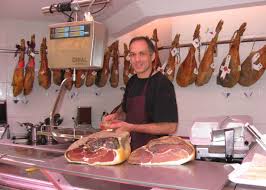butcher
英 ['bʊtʃə]
美 ['bʊtʃɚ]
- vt. 屠杀
- n. 屠夫
- n. (Butcher)人名;(英)布彻
CET4 TEM4 IELTS 考 研 CET6
butcher 屠夫来自buck, 雄鹿, 公羊。插入字母t. 卖羊肉的人。
- butcher
- butcher: [13] Butcher comes via Anglo-Norman boucher from Old French bouchier, a derivative of boc ‘male goat’ (this was probably borrowed from a Celtic word which came ultimately from the same Indo-European base as produced English buck). The original sense of the word was thus ‘dealer in goat’s flesh’.
=> buck - butcher (v.)
- 1560s, from butcher (n.). Related: Butchered; butchering. Re-nouned 1640s as butcherer.
- butcher (n.)
- c. 1300, from Anglo-French boucher, from Old French bochier "butcher, executioner" (12c., Modern French boucher), probably literally "slaughterer of goats," from bouc "male goat," from Frankish *bukk or some other Germanic source (see buck (n.1)) or Celtic *bukkos "he-goat." Figurative sense of "brutal murderer" is attested from 1520s. Butcher-knife attested from 18c. Related: Butcherly. Old English had flæscmangere "butcher" ('flesh-monger').
- 1. Klaus Barbie was known in France as the Butcher of Lyon.
- 在法国,克劳斯·巴比是臭名昭著的“里昂屠夫”。
来自柯林斯例句
- 2. Ask the butcher for soup bones (marrow bones are best).
- 跟肉铺老板要煲汤用的骨头(最好是髓骨)。
来自柯林斯例句
- 3. The butcher's son called out a greeting.
- 屠夫的儿子大声打了个招呼。
来自柯林斯例句
- 4. My grandfather was a butcher.
- 我祖父是个屠夫。
来自柯林斯例句
- 5. He owns the butcher's in the main street.
- 他在大街上开了一家肉铺。
来自《权威词典》
[ butcher 造句 ]
